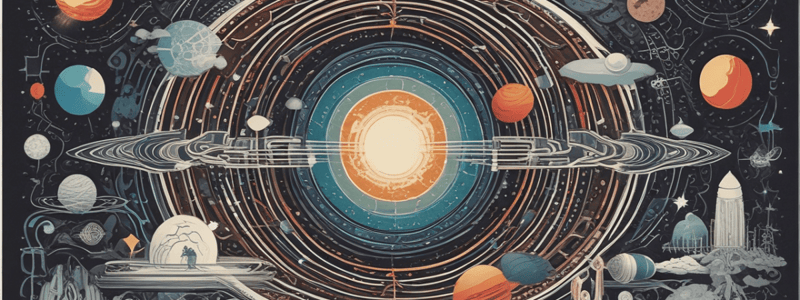Podcast
Questions and Answers
What is the age of the universe according to the currently accepted measurement techniques?
What is the age of the universe according to the currently accepted measurement techniques?
- 13.7 billion years (correct)
- 12 to 14 billion years
- 13.2 billion years
- 15 billion years
What is the basis of the second method used to estimate the age of the universe?
What is the basis of the second method used to estimate the age of the universe?
- Calculating the distance between globular clusters
- The expansion of the universe and the use of Hubble's Law (correct)
- Measuring the temperature of the universe
- Observing the oldest stars of the universe
What is a globular cluster?
What is a globular cluster?
- A type of black hole
- A type of galaxy
- A group of a large number of stars huddled close together in space (correct)
- A region of space where stars cannot form
What is the time elapsed since the Big Bang and today, according to physical cosmology?
What is the time elapsed since the Big Bang and today, according to physical cosmology?
What is the estimated age of the universe based on the Big Bang Theory?
What is the estimated age of the universe based on the Big Bang Theory?
What is the main reason for the uncertainty in the age of the universe?
What is the main reason for the uncertainty in the age of the universe?
What is the range of the age of the universe according to the estimates provided?
What is the range of the age of the universe according to the estimates provided?
What is the estimated uncertainty in Hubble's constant?
What is the estimated uncertainty in Hubble's constant?
Who is the Nobel Prize-winning astrophysicist mentioned in the text?
Who is the Nobel Prize-winning astrophysicist mentioned in the text?
What is believed to help in calculating the age of the universe more accurately?
What is believed to help in calculating the age of the universe more accurately?
Why is it easier to calculate the distance to a globular cluster compared to a single star?
Why is it easier to calculate the distance to a globular cluster compared to a single star?
What mass range do the stars in the oldest globular clusters belong to?
What mass range do the stars in the oldest globular clusters belong to?
According to Hubble's Law, what relationship is demonstrated between a galaxy's recessional velocity and its distance from Earth?
According to Hubble's Law, what relationship is demonstrated between a galaxy's recessional velocity and its distance from Earth?
How can the age of the universe be found using Hubble's constant?
How can the age of the universe be found using Hubble's constant?
What is the most widely accepted age of the universe based on current scientific observations?
What is the most widely accepted age of the universe based on current scientific observations?
Flashcards are hidden until you start studying
Study Notes
The Age of the Universe
- The age of the universe is believed to be around 12-14 billion years, based on the Big Bang Theory, which suggests that the universe began as a compact region that expanded and cooled to form the observable universe we know today.
Estimating the Age of the Universe
- Two methods are used to estimate the age of the universe: observing the oldest stars and using Hubble's Law to measure the expansion of the universe.
Age of the Oldest Stars
- This method involves observing globular clusters, which are groups of stars that are close together in space, making it easier to calculate their distances from Earth.
- The oldest globular clusters have stars with masses lower than 0.7 times the solar mass, which burn for around 11-18 billion years, giving an approximate estimate of the age of the universe.
Hubble's Law
- Hubble's Law states that the universe is expanding at a constant rate, and that the velocity of distant galaxies moving away from Earth is directly proportional to their distance from Earth.
- The law can be written as v = H × d, where v is the recessional velocity, d is the distance, and H is the Hubble constant.
- The age of the universe can be calculated by taking the reciprocal of the Hubble constant, with the most commonly accepted value being around 13.7 billion years.
Calculating the Age of the Universe
- The age of the universe can be calculated using the Hubble constant, which is typically taken as around 67 kilometers per second per megaparsec.
- The calculated age of the universe is around 13.7 billion years, with an uncertainty of around 5%.
Alternative Estimates
- Other estimates of the Hubble constant have resulted in different ages for the universe, ranging from around 12 to 14 billion years.
- Further research and observations, including the study of dark matter and dark energy, are needed to refine the estimate of the universe's age.
Studying That Suits You
Use AI to generate personalized quizzes and flashcards to suit your learning preferences.





